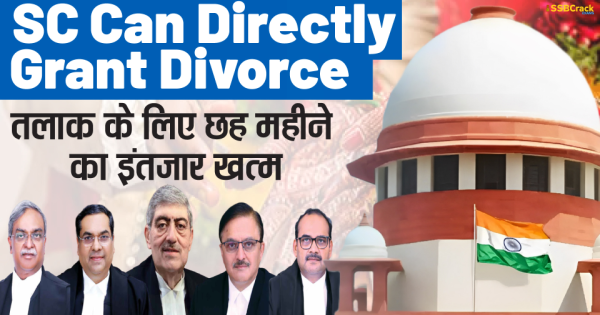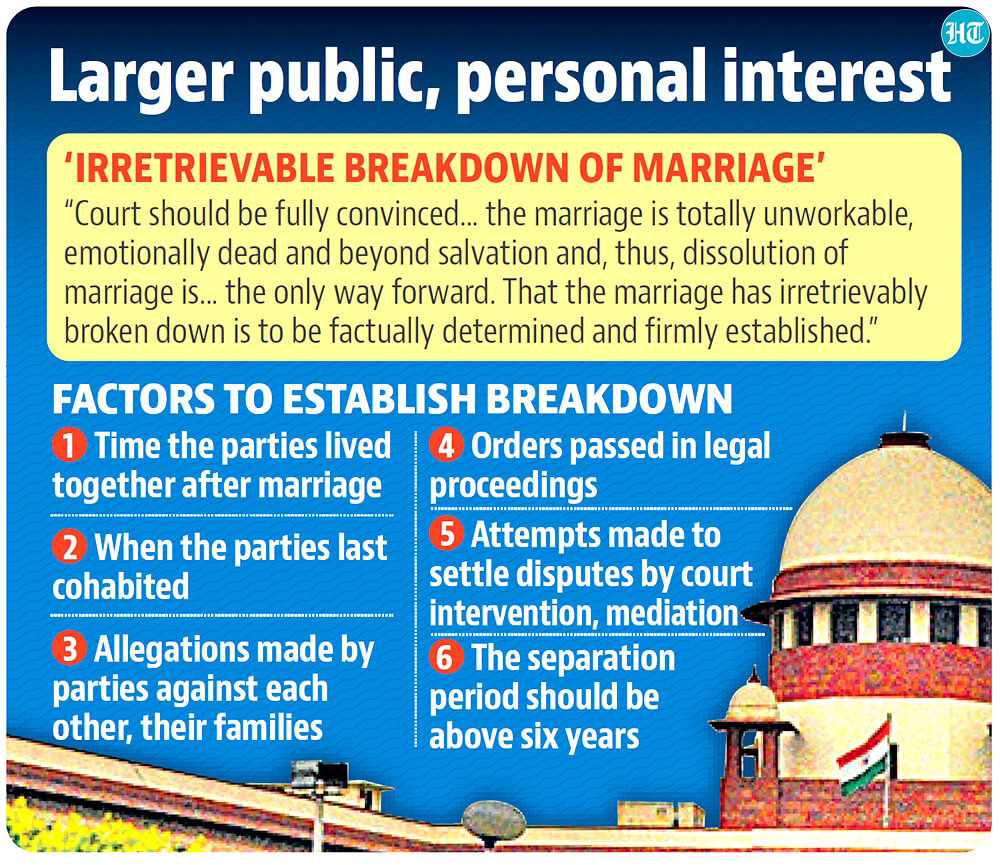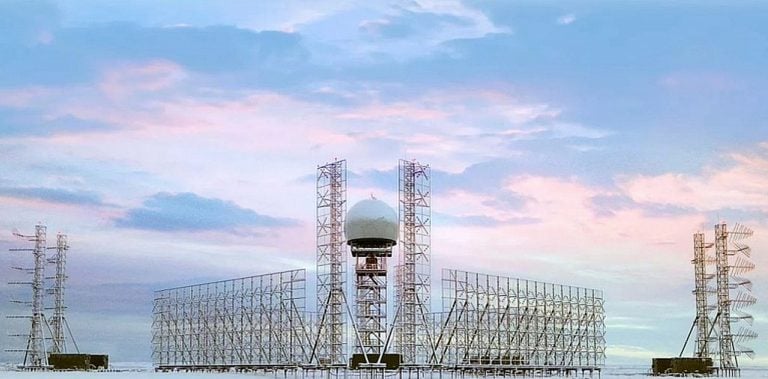On May 1, a five-judge bench issued a decision in the case of Shilpa Sailesh vs Varun Sreenivasan, holding that the Supreme Court can exercise power under Article 142(1) of the Constitution, in light of the settlement between the parties, and grant a decree of divorce by mutual consent, bypassing the period and procedure prescribed under Section 13-B of the Hindu Marriage Act. Divorce is a challenging time for families, especially when children are involved.
Why In The News?
- A 5 Judge Constitution Bench Of The SC Led By Justice S K Kaul Ruled It Can Exercise Its Plenary Power To Do “Complete Justice” Under Article 142(1) Of The Constitution To Dissolve A Marriage On The Ground That It Had Broken Down Irretrievably.
- Without Referring The Parties To A Family Court Where They Must Wait 6-18 Months For A Decree Of Divorce By Mutual Consent. It Can Waive The Mandatory Six-Month Waiting Period For Divorce Under The Hindu Marriage Act (HMA), 1955. (Shilpa Sailesh Vs Varun Sreenivasan Case)
Current Procedure For Divorce – Hindu Marriage Act
- Section 13B Of The HMA Provides For “Divorce By Mutual Consent”.
- Both Parties To The Marriage Must Together File A Petition To The District Court.
- “On The Ground That They Have Been Living Separately For A Period Of One Year Or More, That They Have Not Been Able To Live Together, And That They Have Mutually Agreed That The Marriage Should Be Dissolved”.
- Under Section 13B(2) Of The Act, The Parties Must Move A Second Motion Before The Court “Not Earlier Than Six Months After The Date Of The Presentation Of The [First] Petition…and Not Later Than Eighteen Months After The Said Date, If The Petition Is Not Withdrawn In The Meantime”.
- The Mandatory Six-Month Wait Is Intended To Give The Parties Time To Withdraw Their Plea. The Process Of Obtaining A Decree Of Divorce Is Often Time-consuming And Lengthy Owing To Many Similar Cases Pending Before Family Courts.
- A Petition For Divorce By Mutual Consent Can Be Moved Only After A Year Of The Marriage. However, Section 14 Of The HMA Allows A Divorce Petition Sooner In Case Of “Exceptional Hardship To The Petitioner Or Of Exceptional Depravity On The Part Of The Respondent”.
What Is Article 142 Of The Constitution?
- Article 142 Of The Constitution Of India Provides A Special And Extraordinary Power To The Supreme Court To Pass An Order Or Decree To Do Complete Justice To The Litigants Who Have Traversed Through A Multitude Of Proceedings Tainted With Palpable Illegality Or Injustice.
What Does The Term “Irretrievable Breakdown” Means:
- The First And Most “Obvious” Condition Is That The Court Should Be Fully Convinced And Satisfied That The Marriage Is “Totally Unworkable, Emotionally Dead And Beyond Salvation, Therefore, Dissolution Of Marriage Is The Right Solution And The Only Way Forward”.
- The Court Laid Down The Following Factors:
- The Period Of Time That The Parties Had Cohabited After Marriage;
- When The Parties Had Last Cohabited;
- Nature Of Allegations Made By The Parties Against Each Other And Their Family Members;
- Orders Passed In The Legal Proceedings From Time To Time;
- Cumulative Impact On The Personal Relationship;
- Whether, And How Many Attempts Were Made To Settle The Disputes By A Court Or Through Mediation, And When The Last Attempt Was Made.
- The Court Also Noted That The Period Of Separation Should Be Sufficiently Long, And “Anything Above Six Years Or More Will Be A Relevant Factor”.
- It Emphasised The Need To Evaluate The Factors According To The Economic And Social Status Of The Parties, Including Their Educational Qualifications; Whether They Have Any Children; Their Age; And Whether The Spouse And Children Are Dependents.
To crack the SSB Interview and join the Indian Army as an Officer, You can join our SSB interview live classes batch and we recommend you to Enroll SSB INTERVIEW ONLINE COURSE. Trusted by thousands of defence aspirants.
Also Read:
- Kashmir All Set To Hold G20 Summit In India
- Go First Airlines Files For Insolvency: SSB GD Topic
- India Becomes Europe’s Largest Supplier Of Refined Fuels
- What Is The Met Gala – Fashion’s Biggest Night?
- Clashes In France Against Pension Reforms By Macron Govt
- Why Are Indian Wrestlers Protesting Against WFI Chief?
- China Offers Ukraine To Mediate To End War With Russia
- 50 Years Of Kesavananda Bharati Case: SSB Interview Lecturette Topic
- Assam-Arunachal Pradesh Border Dispute: SSB Interview Lecturette Topic 2023
- Same-Sex Marriages In India: Key Supreme Court Verdicts On LGBTQ Rights
- What Is China Plus One? SSB Interview Lecturette Topic 2023
- India-Maldives Relations: SSB Interview Lecturette Topic 2023
- India-Bangladesh Relations: SSB Interview Lecturette Topic 2023
- India-Japan Relation: SSB Interview Lecturette Topic 2023
- Geopolitical Importance Of The Indian Ocean: SSB Interview Lecturette Topic 2023
- All About Paris Club: SSB Interview Lecturette Topic
- PM Narendra Modi Has Been Named The Most Popular Leader In The World
- Hindenburg Report On Adani – Here’s What You Need To Know
- India At WEF Davos Summit 2023: Here Are 10 Key Highlights
- Pakistan Economic Crisis 2023: SSB Interview Topic [Fully Explained]
- Joshimath Crisis: What Does “Land Subsidence” Mean, And Why Does It Happen?
- Top 10 Animal Conservation Projects In India [MUST WATCH]
- What Is Shanghai Cooperation Organisation (SCO) Summit 2022? [Fully Explained]
- 20 SSB Interview Questions On Russia Ukraine Crisis
- What Is The (India-Israel-UAE-USA) I2U2 Summit? [Fully Explained]
- What Is International North-South Transport Corridor (INSTC)?
- What Is Sri Lankan Crisis? [Fully Explained]
- What Is The BIMSTEC Grouping And How Is It Significant? [EXPLAINED]
- What Is The Places Of Worship (Special Provisions) Act, 1991? [Explained]
- What Is Bodo Accord | SSB Interview Notes [Fully Explained]
- What Is AFSPA: Armed Forces (Special Powers) Act?
- What Is G20 Or Group Of Twenty Countries?
- What Is AFSPA: Armed Forces (Special Powers) Act?
- What Is The Financial Action Task Force (FATF)? [Fully Explained]
- What Is Quadrilateral Security Dialogue (QUAD)?
- Difference Between NATO Vs Russia [Expained]
- What Is United Nations Security Council (UNSC) [Explained]
- Everything You Need To Know About SAARC: South Asian Association For Regional Cooperation
- All About Russia Ukraine War: SSB Interview Topic [Fully Explained]










